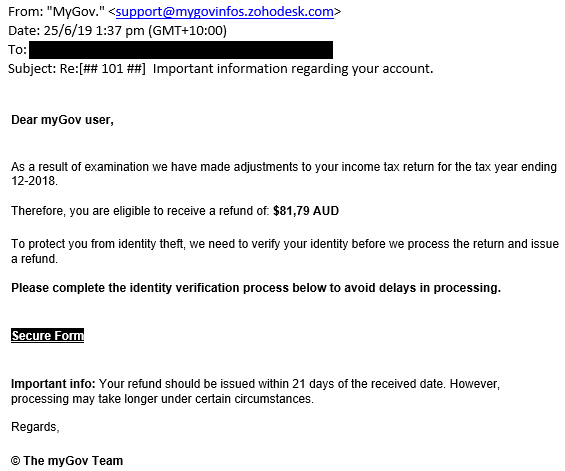Are you concerned that you’ve been a victim of a Scam Mygov Refund? If so, you’re not alone. This article will walk you through how to protect yourself from this type of scam and how to spot the telltale signs of an identity theft or phishing scam. Don’t give your personal information to anyone! It could be your identity, or worse. If you’ve received an email with this type of message, it might be a scam.
Scammygov refund scam
One of the most common Mygov refund scams involves the use of phishing websites. These fake sites look just like the official Mygov website and require the user to provide personal information and a password in order to access their account. These sites use advanced MFA technology to trick people into providing information they shouldn’t. Therefore, it is essential to be cautious and take steps to avoid becoming a victim. Here are some ways to spot a scam.
Scammers will ask you for personal information and ask for credit card numbers. These fraudulent emails can harm your business and your personal information. If you suspect that you’ve received a scam email, post your experience in the comments section below and inform others of this dangerous scam. The more people who report the MyGov refund scam, the better. Sadly, this type of scam continues to be a very common scam. In fact, Australians lost $2,091,239 in the month of March to this scam.
Mailguard warns of an upcoming scam called the Mygov refund scam. The email may seem legitimate, but it’s actually a phishing attempt designed to get your credit card details. If you reply to an email claiming to be from Mygov, your credentials will be stolen and the scammers will be able to use them to scam you even further. Luckily, MailGuard has identified a new scam called Mygov refund that’s been circulating around Australia.
Scammers are using the myGov logo to trick people into believing they’ve received a refund. They will ask them to click on links or fill in an online form. Some scam emails will even prompt you to install an attachment. The email will claim to be from “MyGov – Refund Service” and have a display address of “support@informationconsultancyservices.co.uk”. Despite the obvious mistakes, these emails are convincing enough to fool many people.
- Also Read: One Piece’s Eiichiro Oda Passes Away Complete Details!
- Also Read: Condogames.xyz Roblox Know The Exciting Details!
Phishing
When it comes to phishing, there are some things you should look for. First of all, avoid using any form or website that asks for personal information. Scammers are using this information to commit identity theft and fraud. No government agency will contact you out of the blue asking for your personal information. Also, myGov will never send you an email that includes an attachment or a link that you can’t open. Lastly, do not give them any information about your finances.
Despite this, you can still get scammed by opening an email from the so-called “MyGov” website. The sender and display addresses of these emails are both scams. The displaying address is an address associated with scams, and the sending address is a mess of numbers and symbols. Although the email looks like an official myGov email, there are some mistakes in the spelling, making it convincing enough to fool many people.
The ATO has issued a warning about phishing emails claiming to be from myGov. These emails contain a link that takes the user to a fake ‘Tax Refund’ website and steals personal information. Never click on any link in these emails. Make sure you change your myGov password if you’re unsure of whether or not the email is genuine. You can also contact Services Australia’s Scams and Identity Theft Helpdesk, which is available on Monday to Friday 8am to 5pm AEST.
Mailguard has also recently warned about a new scam targeting Aussies. This scam emails claim that you’re owed a Mygov refund amount but you don’t. It can steal your credentials and trick you into giving them your personal details. Therefore, if you’ve received any such email, you should immediately report it to authorities. So, stay alert and report it to the authorities. And stay safe!
If you’ve received a fraudulent MyGov refund email, don’t panic. The scammers have not used the real MyGov website to send their fake email. Instead, they have used MailGuard users’ email addresses to send the scam emails. These fake emails contain a link that leads to a phishing website that looks like MyGov. However, the phishing site asks for personal information, such as your account password or credit card number. Then, the scammer uses this information to trick you into submitting your personal information.
A fake MyGov refund email asks recipients to click a link to enter their personal information. By capturing personal details, scammers can commit fraud or identity theft. In order to protect yourself from becoming a victim of a scam, make sure you use anti-virus software and double-check the URLs of any suspicious emails. Finally, never make a snap decision based on an email, such as clicking on the link and submitting personal information.
This scam has become a common problem for Australians. Australians have been deceived by these emails, which are purportedly from Mygov. The only problem is that the scammers may steal your personal information or trick you into entering your credit card details. Mailguard has also warned that Mygov refund scam emails are an incredibly dangerous scam that can lead to identity theft. Don’t reply to these emails – they are designed to trick you into entering your personal information without your knowledge.
As long as you’re aware of your own tax situation, you’re less likely to fall victim to this type of scam. But if you’re unaware of your own tax situation, you should be suspicious of any message claiming to give you a tax refund. To confirm whether the message is genuine, login to your official myGov account and check with a registered tax professional. Lastly, never click on any hyperlink in an email from myGov. This is because myGov will never send you an email that contains a hyperlink.
- Also Read: Dejounte Murray and Paolo Banchero Trade Barbs on Instagram Latest Details!
- Also Read: Kitten Milk Roblox Know The Complete Details!
Identity theft
An email from “mygov” claiming to send you a refund is most likely a phishing scam. The scammers send you this email in the hope that you will click on a link and enter your credit card information to claim the refund. However, once you click on the link, you are sent to a fake site that asks for your credit card number and personal details. This is a common way for scammers to steal your credit card information and identity.
In order to steal your identity, the scammers often ask recipients to click on links or submit personal information. However, government agencies don’t contact you out of the blue. Also, myGov will never send you an email with an attachment or link that asks for personal information. In addition, this site has a security page that can help protect your personal information. If you are unsure, go to the security page on myGov’s website.
MyGov has become a popular target for scammers as the end of the financial year draws near. MailGuard has intercepted the latest phishing scam claiming to be from the government. Be wary of these emails as they could steal your credit card or account credentials. Once you find a fake website, report the fraudulent activity. You could lose everything! And you may not even realise it. If you’ve been a victim of a Mygov refund scam, there are many ways to protect yourself.
If you’re concerned about your identity, try and find out more about it. A number of companies are using your personal information to target you with phishing emails. For example, some government websites send emails asking you to invest in a product or service. The scammers use this information to commit tax fraud and identity theft. Rather than responding to these emails, they usually ask you for personal information and log in to their site.
Safeguarding personal information
Scammers usually use myGov logos to trick people into believing they have received a tax refund. These scam emails will prompt you to click on a link to claim your refund. However, what you are receiving is a fake tax refund claim form. Do not click on it. Instead, contact the Revenue Office or your credit card company for more information. This way, you will be able to avoid falling victim to scammers.
Scammers use this information to commit fraud or identity theft. Never enter credit card numbers or any other personal information into an email or link that appears to come from myGov. The ATO and myGov will never ask you for such personal information. Even if you do receive an email claiming that you’ve won a refund, you should never open the link. This is a sign of a scam.
If you do receive an email from MyGov, log in to the official site instead of using your email. Your account is secure and messages from the website are safe to open. If you’re unsure, contact Australia’s National Identity and Cyber Support Service, use the free Cyber First Aid Kit, and report any suspicious emails to the Australian Crime Online Reporting Network. Alternatively, you can report the scammer to myGov inbox.
- Also Read: Last Pirates Trello Read Essential Details!
- Also Read: How to Watch Sp4r3 M3 gr34T l0rd? Know Details!
- Also Read: Zambian Meat Website Know The Authentic Details!















